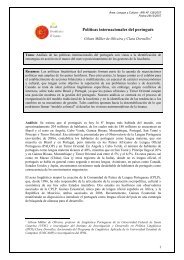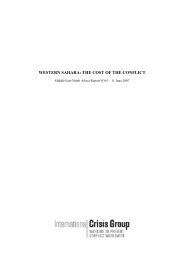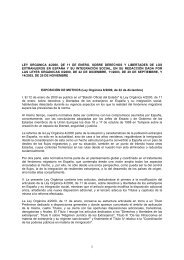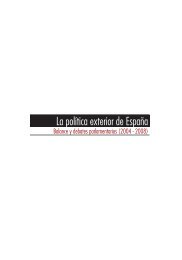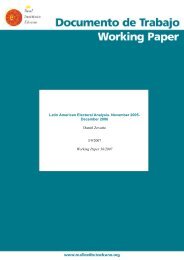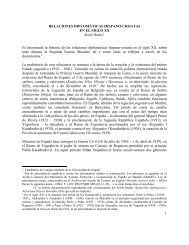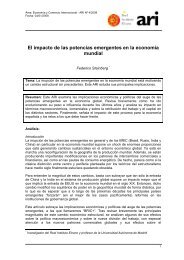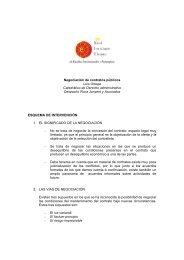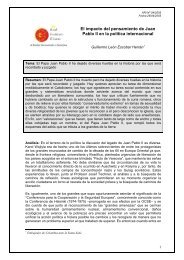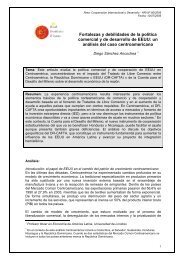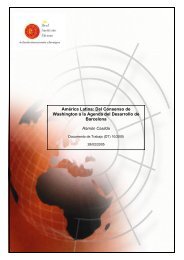Spain and the United States - Real Instituto Elcano
Spain and the United States - Real Instituto Elcano
Spain and the United States - Real Instituto Elcano
You also want an ePaper? Increase the reach of your titles
YUMPU automatically turns print PDFs into web optimized ePapers that Google loves.
OVERVIEW 39<br />
was <strong>the</strong> main instigator of <strong>the</strong> article published in <strong>the</strong> Wall Street Journal<br />
(January 29, 2003), signed by <strong>the</strong> prime ministers of <strong>Spain</strong>, Portugal, Italy, <strong>the</strong><br />
<strong>United</strong> Kingdom, Pol<strong>and</strong>, Hungary, Denmark <strong>and</strong> <strong>the</strong> Czech Republic, which<br />
said that “<strong>the</strong> transatlantic relation must not fall victim to <strong>the</strong> constant attempts<br />
of <strong>the</strong> Iraqi regime to threaten world security.” Aznar unsuccessfully tried to<br />
persuade Mexico <strong>and</strong> Chile, also non-permanent members of <strong>the</strong> Security<br />
Council, to back a UN resolution authorising <strong>the</strong> use of force in Iraq. 36 At <strong>the</strong><br />
height of <strong>the</strong> government’s cooperation with <strong>the</strong> US, a Spanish marketing<br />
campaign was launched carrying <strong>the</strong> tagline: “Your friend in Europe”. More<br />
American tourists visited <strong>Spain</strong> that year.<br />
<strong>Spain</strong> joined <strong>the</strong> so-called “coalition of <strong>the</strong> willing”, symbolized by <strong>the</strong><br />
photograph of Bush, Blair <strong>and</strong> Aznar at <strong>the</strong>ir summit in <strong>the</strong> Azores. 37 “<strong>Spain</strong><br />
can no longer be in <strong>the</strong> same corner as <strong>the</strong> countries which do not count, do not<br />
serve <strong>and</strong> do not decide,” said Aznar shortly before <strong>the</strong> invasion of Iraq. “In<br />
order to place our country among <strong>the</strong> most important ones in <strong>the</strong> world when<br />
<strong>the</strong> world is threatened, <strong>Spain</strong> must assume its responsibilities <strong>and</strong> do so with<br />
courage, determination <strong>and</strong> leadership.” <strong>Spain</strong>, however, did not contribute<br />
combat troops to <strong>the</strong> invading force, although Aznar did seriously consider<br />
sending <strong>the</strong>m. But this would have been too much even for his own party.<br />
The alignment with Washington over Iraq was perceived by many in <strong>the</strong><br />
heart of Europe, particularly Germany <strong>and</strong> France, as obstructionist, if not<br />
downright confrontational. It also went against <strong>the</strong> wishes of <strong>the</strong> overwhelming<br />
majority of <strong>the</strong> Spanish population (around 90% expressed opposition to <strong>the</strong><br />
war with Iraq in opinion polls, <strong>the</strong> highest level in Europe). Aznar, however,<br />
stuck to his guns <strong>and</strong> sent 1,300 peacekeeping troops to Iraq. 38 In return, to<br />
some extent, for his support, Washington added Batasuna, <strong>the</strong> political wing of<br />
Basque armed separatist group ETA that had been declared illegal, to its list of<br />
terrorist groups, <strong>and</strong> shortly before stepping down as prime minister (having<br />
vowed not to run for a third term), Aznar was accorded <strong>the</strong> honour of<br />
addressing a joint session of Congress. Awarding him <strong>the</strong> Congressional Gold<br />
Medal, <strong>the</strong> highest award bestowed by <strong>the</strong> US government which Tony Blair<br />
36. Despite Chile refusing to lend its support, Aznar was able to intercede personally with Bush <strong>and</strong> get<br />
him to agree to sign <strong>the</strong> free trade accord with Chile in September 2003. The agreement ran <strong>the</strong> risk of being put<br />
back because Chile appeared to be “unfriendly”.<br />
37. In his book, Retratos y perfiles (Planeta, 2005, pp. 265-74), Aznar said, “<strong>Spain</strong> was at <strong>the</strong> Azores<br />
because it could not participate in <strong>the</strong> Norm<strong>and</strong>y l<strong>and</strong>ing, which is where we should have been.” <strong>Spain</strong> was<br />
officially neutral in <strong>the</strong> Second World War, but Franco aided Hitler <strong>and</strong> Mussolini.<br />
38. A dissenting voice, though not in public, was Rodrigo Rato, <strong>the</strong> deputy prime minister for economic<br />
affairs. According to Federico Trillo, <strong>the</strong> defence minister at <strong>the</strong> time, Rato firmly expressed his opposition to<br />
<strong>Spain</strong>’s military involvement at a cabinet meeting shortly before <strong>the</strong> invasion of Iraq. In its place, he suggested<br />
humanitarian aid. See Memoria de entreguerras. Mis años en el Ministerio de Defensa by Federico Trillo<br />
(Planeta, 2005).



